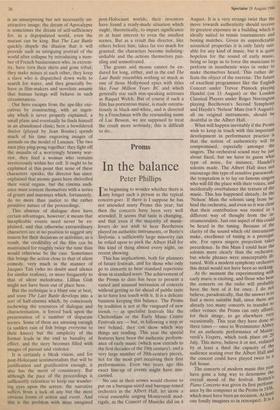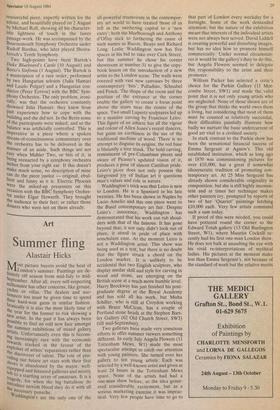Proms
In the balance
Peter Phillips
T'm beginning to wonder whether there is
any longer such a person as the typical concert-goer. If there is I suppose he has not attended many Proms this year; but then the concerts have been very well attended. It seems that taste is changing, and that even if the majority of music- lovers do not wish to hear Beethoven played on authentic instruments, or Berio's Sinfonia, a sufficiently large minority can be relied upon to pack the Albert Hall for this kind of thing almost every night, on recent showing.
This has implications, both for planners of future festivals, and for those who only go to concerts to hear standard repertoire done in standard ways. The achievement of the Proms to date has been to present a varied and unusual succession of concerts without getting so far ahead of public taste as to have lost touch with it. It is a delicate business keeping this balance. The Proms by tradition is not at the vanguard of new trends — as specialist festivals like the Cheltenham or the Early Music Centre Festivals are — but, in following a step or two behind, they can show which way things are tending. This year the special features have been the authentic perform- ance of early music (which now extends to the first decades of the 19th century), and a very large number of 20th-century pieces, not for the most part receiving their first performances. Even two years ago this exact line-up of events might have mis- carried.
No one in their senses would choose to put on a baroque-sized and baroque-toned orchestra in the Albert Hall, let .alone a vocal ensemble singing Monteverdi mad- rigals, as the Consort of Musicke did on 4
August. It is a very strange twist that the move towards authenticity should receive its greatest exposure in a building which is ideally suited to tennis tournaments and boxing matches. Given its unpredictable acoustical properties it is only fairly suit- able for any kind of music, but it is quite hopeless for the sound of early music, being so large as to force the musicians to perform in inauthentic ways in order to make themselves heard. This rather de- feats the object of the exercise. The future of excellent programmes like the English Concert under Trevor Pinnock playing Handel (on 11 August) or the London Classical Players under Roger Norrington playing Beethoven's Second Symphony and Haydn's 'Nelson' Mass (on 9 August), all on original instruments, should be doubtful in the Albert Hall.
What will happen inevitably if the Proms wish to keep in touch with this important development in performance practice is that the notion of authenticity will be compromised, especially amongst the singers. The orchestral sound may be just about fixed, but we have to guess what type of noise, for instance, Handel's soloists made. The Albert Hall does not encourage this type of sensitive guesswork: the temptation is to lay on famous singers who will fill the place with their voices, and incidentally overbalance the texture of the music. This has happened already. In the 'Nelson' Mass the soloists sang from be- hind the orchestra, and even so it was clear that their contribution was rooted in a different way of thought from the in- strumentalists. Just one aspect of this could be heard in the tuning. Because of the clarity of the sound which old instruments make, excellence of tuning is a prerequi- site. For opera singers projection takes precedence. In this Mass I could hear the soloists more clearly than the orchestra, but whole phrases were unacceptably ill" tuned. With a modern symphony orchestra this detail would not have been so striking• At the moment the experimenting with early music is exciting, and those who hear the concerts on the radio will probably have the best of it for once. I do not believe, paradoxically, that the answer is to find a more suitable hall, since there are already too many concerts to transfer to other venues: the Proms can only afford, for their image, to go elsewhere very occasionally. This year they have done so three times — once to Westminster AbbeY for an authentic performance of Monte- verdi's Vespers, which took place on 29 July. This move, believe it or not, reduced by at least a third the capacity of the audience seating over the Albert Hall and the concert could have played twice to a full house. The concerts of modern music this year have gone a long way to determine the overall mood of the festival. Britten's Piano Concerto was given its first perform• ance by the composer at the Proms in 1938, which must have been an occasion. At least one fondly imagines so in retrospect. It is a
resourceful piece, expertly written for the soloist, and beautifully played on 2 August by Michael Roll, showing all his character- istic lightness of touch in the faster passage-work. He was accompanied by the Bournemouth Symphony Orchestra under Rudolf Barshai, who later played Shosta- kovich's Tenth Symphony.
Two high-points have been Bartok's Duke Bluebeard's Castle (10 August) and Berio's Sinfonia (1 August). The Bartok is a masterpiece of a rare order, performed by two Hungarian soloists (Julia Hamari and Laszlo Polgar) and a Hungarian con- ductor (Peter Eotvos) with the BBC Sym- phony Orchestra. The only problem, ironi- cally, was that the orchestra constantly drowned Julia Hamari: they knew from past experience how to cope with the building and she did not. In the Berio some of the participants were miked, and so the balance was artificially controlled. This is imperative in a piece where a spoken stream-of-consciousness commentary over the orchestra has to be delivered in the manner of an aside. Such things are not easy when Mahler Two, or bits of it, is being reenacted by a symphony orchestra inches from your right ear. If this doesn't Make much sense, no description of mine can do the piece justice — original, ebul- lient and funny as it is. Electric Phoenix Were the miked-up presenters on this occasion with the BBC Symphony Orches- tra under Elgar Howarth. They brought the audience to their feet; or rather those dossers who were not on them already.







































 Previous page
Previous page